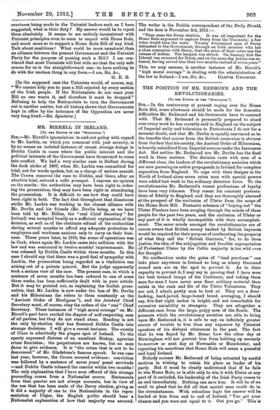MR. BIRRELL IN IRELAND.
ETD THE EDITOR or VIZ "SPECTATOR."J Birrell's ignominious in-and-out policy with regard to Mr. Larkin, on which you comment with just severity, is by no means an isolated instance of recent strange doings in Dublin Castle in cases where the public interest and the political interests of the Government have threatened to come into conflict. We had a very similar case in Belfast during the dock strike of 1907, when Mr. Larkin was committed for trial, not for words spoken, but on a charge of serious assault. The Crown removed the case to Dublin, and there, after an abortive trial, entered a rolls prosequi. I express no opinion on the merits : the authorities may have been right in order- ing the prosecution, they may have been right in abandoning the prosecution. It is difficult to see how they could have been right in both. The fact that throughout that disastrous strike Mr. Larkin was working in the closest alliance with Mr. Devlin and his friends (Mr. Devlin being, as we have been told by Mr. Dillon, the "real Chief Secretary " for Ireland) was accepted locally as a sufficient explanation of the decision, as well as of the obstinate refusal of the authorities during several months to afford any adequate protection to employers and workmen anxious only to carry on their busi- ness. Three years later, in 1910, the scene of operations was in Cork, where again Mr. Larkin came into collision with the law and was sentenced to twelve months' imprisonment. He was released by Dublin Castle within three months. In this case I should say that there was a good deal of sympathy with Larkin, the prosecution being regarded as a vindictive one arising out of a private quarrel. But the judge apparently took a serious view of the case. The present case, in which a sentence of seven months has been reduced to one of some three weeks, has been sufficiently dealt with in your article. But it may be pointed out, as explaining the foolish prose- cution, that Mr. Larkin is now under the ban of Mr. Devlin and his Hibernians (be refers to them constantly as the "Ancient Order of Hooligans "), and the faineant Chief Secretary must, of course, obey the orders of the "real" Chief Secretary. These instances of " high moral courage" on Mr. Birrell's part have excited the disgust of self-respecting men of all parties, but they do not stand alone. Reading is not the only by-election that has flustered Dublin Castle into strange decisions. I will give a recent instance. The county of Clare is admittedly the plague spot of Ireland. To the openly expressed distress of an excellent Bishop, agrarian crime flourishes ; the perpetrators are known, but no man dares to give evidence. It is "the crime that is not to be denounced" of Mr. Gladstone's famous speech. In one case last year, however, the Crown secured evidence: conviction was followed by a sentence of seven years' penal servitude —and Dublin Castle released the convict within two months ! The only explanation that I have seen offered of this strange proceeding comes from a Nationalist source. Statements from that quarter are not always accurate, but in view of the use that has been made of the Derry election, giving as it did a majority of one to the Nationalists in the repre- sentation of Ulster, the English public should hear a liationalist explanation of how that majority was secured. The writer is the Dublin correspondent of the Daily Herald, and the date is November 3rd, 1913 :- "Then came the Derry election. It was all important for the Home Rule argument to capture Derry from the Unionists : a few votes would turn the scale. Twenty determined men of Derry intimated to the Government, through an Irish member who has a close connexion with Derry, that the price of their votes was the release of Arkins. The bargain was struck. On January 31st the Liberal was returned for Derry, and on the same day Arkins was re- leased, having served less than two months instead of seven years."
This, we may assume, is another instance of Mr. Birrell'a "high moral courage" in dealing with the administration of
the law in Ireland.—I am, Sir, &e., ULSTVZ -UNIONIST.


















































 Previous page
Previous page